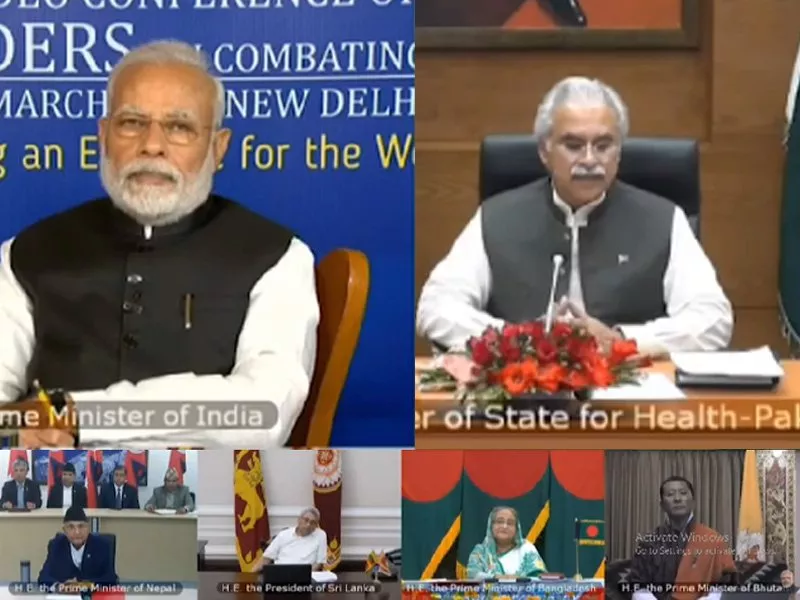Pakistan seeks revival of SAARC health committee to fight Covid-19
Hosts video conference of region’s health ministers; Foreign Office says 138 Pakistanis die of coronavirus abroad
ISLAMABAD: Pakistan on Thursday sought the revival of the South Asian Association for Regional Corporation’s (Saarc) Technical Committee on Health in order to evolve a common strategy against the novel coronavirus virus.The proposal was part of a host of measures suggested by Dr Zafar Mirza, the de facto health minister, while hosting a video conference of Saarc ministers and officials on the Covid-19 pandemic, according to the foreign office statement.
Dr Mirza, the special assistant to the prime minister on health services and regulations, chaired the meeting, attended by all member states and the Saarc Secretary General, Esala Ruwan Weerakoon, the Foreign Office statement said.
Pavithra Wanniarachchi, Minister for Health and Indigenous Medical Services of Sri Lanka; Nabraj Raut, State Minister for Health and Population of Nepal; Dr Wahid Majrooh, Deputy Minister for Healthcare Services of Afghanistan; Dr Ugen Dophu, Health Secretary of Bhutan, Prof Dr Abul Kalam Azad, Director General of Health Services of Bangladesh; Maimoona Aboobakuru, Director General of Public Health of Maldives; and Prof Rajiv Garg, Director General of Health Services of India led their respective delegations.
Issues, including real-time sharing of information and clinical data, capacity building and training of medical and paramedical staff, supply of medicines and medical equipment, research coordination and enhancing cooperation with frontline international organisations, including the World Health Organization (WHO) came under discussion.
Sharing Pakistan’s perspective, Dr Mirza underscored that South Asia was particularly vulnerable on account of its high population densities, fragile health systems and rudimentary disease surveillance. He said that the uncertainties associated with the outbreak had left no room for complacency, adding however that it also posed an opportunity for South Asia to strengthen health systems.
SAARC states back unified virus response
Dr Mirza briefed the participants about the containment and relief measures being taken by Pakistan, stressing that the National Coordination Committee headed by Prime Minister Imran Khan was focussed on implementing a national action plan against Covid-19.
He highlighted Pakistan’s strategy of smart lockdowns aimed at containing the virus, while ensuring that economic activity was minimally impeded. The participants agreed to work together to adopt best international practices keeping in view the specific socio-economic circumstances of South Asia.
During the conference, all heads of delegation presented their country situations and efforts to contain the outbreak at national levels. Proposals to fast-track creation of linkages among medical universities, academia and research institutions came under review.
Pakistan proposed greater coordination among health authorities of Saarc member states in the context of combating the pandemic and in this regard, suggested activating the Saarc Technical Committee on Health and Population Activities. It was agreed to enhance cooperation in the health sector, particularly in the context of efforts to combat the virus at the regional level.
“The Health Ministers’ Video Conference was a reaffirmation of Pakistan’s commitment to the Saarc process and its efforts to forge closer cooperation among Member States in situations such as the Covid-19 pandemic,” the foreign office statement read.
All the member states and the Saarc secretary general appreciated Pakistan’s timely initiative of organising the video conference. The Saarc has long remained dysfunctional because of the acrimonious relationship between Pakistan and India. But the outbreak of coronavirus has compelled member states to revive the regional grouping, which has never truly realised its potential due to Indo-Pak rivalry.
Foreign Office briefing
Speaking at weekly news briefing, Foreign Office spokesperson Aisha Farooqui said that the foreign ministry and its missions abroad continued to provide relief and assistance to the overseas Pakistani community in the wake of Coronavirus.
“Food ration and financial assistance is being provided to those in need,” the spokesperson said. She added that repatriation of Pakistanis was continuing as per a comprehensive and phased plan developed with the coordination of relevant stakeholders.
She informed reporters that 5,079 Pakistanis had so far been brought back from different countries in the third phase of this plan. In addition, 1,254 Pakistani nationals were brought back through land borders in the last few days, including 41 from India through the Wagah border. She said at least 138 Pakistanis lost their lives due to coronavirus in different countries.
Farooqui, meanwhile, voiced serious concerns over anti-Muslim policies by “RSS-inspired” Indian government led by Prime Minister Narendra Modi. Farooqui regretted that these policies persist regardless of the challenges posed by Covid-19 pandemic.
“A systematic campaign is unfortunately underway in India to demonise Muslims, who face increased exclusion as well as threat of mob violence,” the spokesperson said. She referred to the concern shown by the Organisation of Islamic Cooperation (OIC) over the rising anti-Muslim sentiments amplified by the Indian government’s discriminatory policies.
Prominent figures in the Gulf region also reacted sharply to Modi’s fascist policies after right-wing Hindu nationalists launched a deliberate campaign, holding Muslims in India responsible for the spread of Covid-19.
The spokesperson also expressed concerns over the persecution of journalists in Indian occupied Kashmir, while reminding that Kashmir was an internationally-disputed territory and the killing of people, use of brute force and blocking communication links constituted violation of international laws.


COMMENTS
Comments are moderated and generally will be posted if they are on-topic and not abusive.
For more information, please see our Comments FAQ